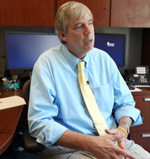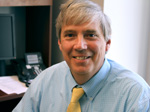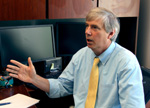|
By Dawn
Brazell
Public Relations
An encyclopedia
of knowledge on anything you could
ever want to know about the health
effects of smoking and tobacco
policy, K. Michael Cummings,
Ph.D., knows how to tell it like
it is.
Just ask the
tobacco industry.
 Cummings, who joined
MUSC in October as a professor in
the Department of Psychiatry &
Behavioral Sciences, has authored
landmark reports for the Office of
the Surgeon General and the
National Cancer Institute. In the
late 1990s, Cummings scanned and
posted online previously-secret
tobacco industry documents
detailing how product design
influences smoking behavior and
nicotine addiction. He has served
as an expert witness against the
tobacco industry in prominent
legal proceedings, including cases
that resulted in the Master
Settlement Agreement. Cummings, who joined
MUSC in October as a professor in
the Department of Psychiatry &
Behavioral Sciences, has authored
landmark reports for the Office of
the Surgeon General and the
National Cancer Institute. In the
late 1990s, Cummings scanned and
posted online previously-secret
tobacco industry documents
detailing how product design
influences smoking behavior and
nicotine addiction. He has served
as an expert witness against the
tobacco industry in prominent
legal proceedings, including cases
that resulted in the Master
Settlement Agreement.
He has a plaque
"tobacco road" on top of a
bookcase in his office in the
Bioengineering Building, where he
works as part of Hollings Cancer
Center's Cancer Prevention and
Control program, leading research
on tobacco control, public policy
and smoking cessation.
When asked what
his vision is for South Carolina,
he details an impassioned plan.
"We can't
afford tobacco anymore. It's a
luxury. The odds of dying from
smoking — one out of two. Get a
coin out and flip it. If you're a
smoker, one out of two will die
prematurely as a result from
smoking — not good odds. Not good
odds when you look at your parents
or your sister or siblings, or
co-workers who are addicted to
cigarettes."
More than
440,000 Americans are going to die
this year from smoking and that
number can be multiplied by 20 to
compute the number of people
seriously ill from smoking in this
country, he said.
As one of the
world's leading authorities on
tobacco policy, Cummings wants to
start changing the statistics in
this state, bending back the
mortality curve. He brings to bear
his 30-year experience from
Roswell Park Cancer Institute in
New York where he ran the New York
state smokers' quitline, building
it up to be the biggest quitline
services in the world serving more
than a million callers since
opening in 2000. He's used to
working with rural populations
with high smoking rates and low
access to health care.
 "The opportunity here
to grow a program brought me here.
Tobacco remains a big problem in
the South, even though most
tobacco used in US cigarettes
today is imported from overseas." "The opportunity here
to grow a program brought me here.
Tobacco remains a big problem in
the South, even though most
tobacco used in US cigarettes
today is imported from overseas."
Cummings also
is interested in the problem
worldwide. He's involved in
studies in 22 countries, tracking
the beliefs and attitudes of
smokers and non-smokers and the
effectiveness of varying policies
used to treat smokers. Cummings
said the rising smoking rates
internationally will have a huge
impact on public health with
serious economic repercussions.
"One-third of
all cancers are due to smoking.
Imagine if we had a vaccine that
could prevent one-third of all
cancers. The answer is we do —
don't smoke. If we could reduce
cigarette consumption by 10
percent we could prevent millions
of deaths from cancer over the
next two decades."
While
biomedical research to improve
detection and treatment of cancer
is important to do, the most
immediate benefits for cancer
control will come by lowering
smoking rates in the population,
he said. It costs every South
Carolina household about $1,000
per year to cover the health care
costs from smoking-related
illnesses.
"We can't
afford to subsidize tobacco
profits any longer."
 Cummings said
Hollings is already doing
important research on tobacco and
tobacco cessation. Most of his
research at Roswell stemmed from
what he learned about addiction
from smokers who came to his
cessation classes. He wanted to
find out why they were having such
a hard time quitting and develop
effective treatment strategies.
He's encouraged by the latest
scientific advances that range
from studying the effectiveness of
combination therapies to the
development of nicotine vaccines
that could be used to help the
body develop an antibody to
nicotine. Cummings said
Hollings is already doing
important research on tobacco and
tobacco cessation. Most of his
research at Roswell stemmed from
what he learned about addiction
from smokers who came to his
cessation classes. He wanted to
find out why they were having such
a hard time quitting and develop
effective treatment strategies.
He's encouraged by the latest
scientific advances that range
from studying the effectiveness of
combination therapies to the
development of nicotine vaccines
that could be used to help the
body develop an antibody to
nicotine.
Cummings' plans
include establishing comprehensive
smoking cessation services
available to residents statewide
and launching a large study
combining smoking cessation with
spiral CT scanning to screen heavy
smokers and formerly-heavy smokers
for lung cancer. MUSC was part of
a large national study by the
National Lung Cancer screening
trial that found a 20 percent
reduction in mortality from lung
cancer because low-dose spiral CT
screenings led to earlier
detection and treatment.
"Here's the
exact reason you do translational
science. This is translating the
science of imaging and biomarkers
into something that will make a
difference on a population-wide
basis. About two-thirds of lung
cancers are diagnosed in a late
stage where treatments typically
don't work well. We've got to make
a bigger difference, and we've got
to do it sooner."
Cummings' hope
in the next decade in the state is
to drop the late-stage detection
rate of lung cancer from
two-thirds to under a third. This
will flip the survival curve
around so that most of the lung
cancers can be managed the way
most breast cancers are today.
He'll continue
to do what he does best — educate
people about the dangers of
tobacco use so they can make
educated decisions. He has
compassion for smokers.
"They get
addicted to the product. The
product has a high abuse
liability. I think people ought to
have free choice. This is about
free choice," Cummings said,
citing research that most smokers
would quit if they could. He likes
to educate smokers about what it's
going to be like to quit, how to
prepare for a relapse, and what it
is about cigarettes that makes
them so addictive and lethal.
Cummings
believes smokers have a right to
know cigarettes are engineered to
be inhalable and highly addictive.
That's why 85 percent of users
today are addicted, persistent
daily users. "You have 15 percent
of people who use alcohol and have
an abuse problem. With cigarettes,
85 percent get hooked and
typically struggle for decades
before they quit or get sick.
That's why cigarettes are such a
huge problem. There is no reason
that cigarettes have to be
designed to make them so hard to
quit, except that tobacco
companies have chosen to put their
profits ahead of the health of
their customers. This has to
change, and it can be changed."
To see an
interview with Cummings, visit http://www.youtube.com/user/prmusc?feature=mhee.
To see MUSC's tobacco-free campus
website, visit http://www.musc.edu/tobaccofree.
|



 Cummings, who joined
MUSC in October as a professor in
the Department of Psychiatry &
Behavioral Sciences, has authored
landmark reports for the Office of
the Surgeon General and the
National Cancer Institute. In the
late 1990s, Cummings scanned and
posted online previously-secret
tobacco industry documents
detailing how product design
influences smoking behavior and
nicotine addiction. He has served
as an expert witness against the
tobacco industry in prominent
legal proceedings, including cases
that resulted in the Master
Settlement Agreement.
Cummings, who joined
MUSC in October as a professor in
the Department of Psychiatry &
Behavioral Sciences, has authored
landmark reports for the Office of
the Surgeon General and the
National Cancer Institute. In the
late 1990s, Cummings scanned and
posted online previously-secret
tobacco industry documents
detailing how product design
influences smoking behavior and
nicotine addiction. He has served
as an expert witness against the
tobacco industry in prominent
legal proceedings, including cases
that resulted in the Master
Settlement Agreement. "The opportunity here
to grow a program brought me here.
Tobacco remains a big problem in
the South, even though most
tobacco used in US cigarettes
today is imported from overseas."
"The opportunity here
to grow a program brought me here.
Tobacco remains a big problem in
the South, even though most
tobacco used in US cigarettes
today is imported from overseas."
 Cummings said
Hollings is already doing
important research on tobacco and
tobacco cessation. Most of his
research at Roswell stemmed from
what he learned about addiction
from smokers who came to his
cessation classes. He wanted to
find out why they were having such
a hard time quitting and develop
effective treatment strategies.
He's encouraged by the latest
scientific advances that range
from studying the effectiveness of
combination therapies to the
development of nicotine vaccines
that could be used to help the
body develop an antibody to
nicotine.
Cummings said
Hollings is already doing
important research on tobacco and
tobacco cessation. Most of his
research at Roswell stemmed from
what he learned about addiction
from smokers who came to his
cessation classes. He wanted to
find out why they were having such
a hard time quitting and develop
effective treatment strategies.
He's encouraged by the latest
scientific advances that range
from studying the effectiveness of
combination therapies to the
development of nicotine vaccines
that could be used to help the
body develop an antibody to
nicotine.